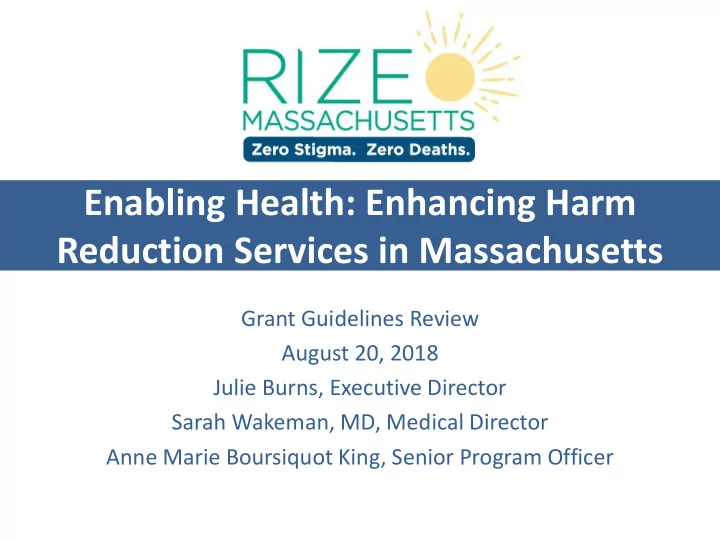

Enabling Health: Enhancing Harm Reduction Services in Massachusetts Grant Guidelines Review August 20, 2018 Julie Burns, Executive Director Sarah Wakeman, MD, Medical Director Anne Marie Boursiquot King, Senior Program Officer
Agenda Introduction Program Overview Goal & Objectives Keys to Success Eligibility Program Implementation Application Process Q&A
What is RIZE RIZE Massachusetts (RIZE) is an independent nonprofit committed to achieving zero stigma and zero deaths related to opioid use disorder by investing in the best solutions and brightest minds to save lives, reduce harm, and end the opioid epidemic in Massachusetts.
Program Overview RIZE plans to award a limited number of grants of up to $150,000 per year for the next two (2) years through this grant. The goals are to: • expand existing harm reduction services with novel interventions, such as fentanyl test strips or other drug checking measures • develop immediate access to low threshold addiction treatment through clinical partnerships. Low threshold means programs that focus on access and engagement rather than strict rules or barriers to treatment. Examples would include providing, but not requiring, counseling as a component of medication for opioid use disorder (OUD) treatment and not terminating patients from treatment for ongoing substance use
Program Overview For the purposes of this grant, a harm reduction agency is defined as a program which delivers non-judgmental and non-coercive services aimed at reducing the adverse health, social and economic consequences of drug use without necessarily reducing drug consumption. Services delivered by a harm reduction agency must affirm the dignity of people who use drugs and seek to empower and benefit people who use drugs, their families, and the community.
Keys to Success The following elements are likely to be key success factors: Participation by a harm reduction agency and a clinical partner at a minimum; • Active engagement with people who use drugs; • Immediate access to buprenorphine treatment and direct linkage to methadone or naltrexone with • medication treatment plan determined based on clinical appropriateness and patient preference; Treatment offered onsite by the clinical partner except for methadone, which would be provided at • an opioid treatment program; Systems for outreach and a plan to promote retention in care; • Integration of novel harm reduction services; • Demonstrated commitment to cultural competence; • Collection of data that will allow tracking of high-level trends; • Understanding of the laws and regulations related to harm reduction activities •
Examples of Potential Programs Strengthening existing syringe exchange to include more harm reduction • services (i.e. drug checking) while expanding low threshold treatment and evaluation a with clinical partner Partnership between harm reduction service and clinical lead to add a • clinician to outreach teams and provide immediate access to medication for addiction treatment Create a new harm reduction service or collaborative outreach program to • serve new patient populations and expand opportunities for access to treatment Example of funding uses: • – hire onsite behavioral health staff in addition to clinical providers to initiate medications for addiction treatment – build the applicant’s surveillance, data collection, and evaluation capabilities – IT upgrades or new platforms to support intake, case management, and data collection
Eligibility • Proposals are invited from collaborations of harm reduction agencies and community-based providers. Partnerships must include a harm reduction agency as the lead and a clinical partner that may be a: – Primary care clinic/practice – Community health center – Emergency department/hospital – Community mental health organization
Eligibility (Continued) • The lead harm reduction organization will be responsible for project reports and grant accountability. • The clinical partner must have the capacity to refer individuals to treatment for co-occurring medical and psychiatric disorders as needed. • Must be a MA based non-profit organization or government (municipal) agency.
Award Criteria Only proposals that include a harm reduction agency as the lead with a clinical partner as outlined above will be considered. Safe injection facilities will not be considered. Other factors for consideration include: Demonstrated experience providing harm reduction services; • Evidence of a strong clinical partner with the ability to offer immediate access to medication for • OUD; Indication of population in need. Proposals must focus on individuals with opioid use disorder at • greatest risk for overdose and eligible for immediate treatment; History of serving vulnerable patient populations, such as those experiencing incarceration, • homelessness or pregnant or parenting woman, those who experience barriers to health care; Evidence of commitment to collaborative planning and problem solving by individuals with decision- • making authority within participating organizations; Evidence of commitment to involving people who use drugs in program planning and • implementation; Evidence of delivering culturally competent care and services; • Demonstrated capacity for fiscal accountability and programmatic achievement; • Demonstrated capacity for conducting substantive program evaluation, including a description of • how outcomes will be measured; Commitment to sustainability and opportunities for replication; • Willingness to participate in RIZE Massachusetts activities to share ideas and best practices among • grantees and other interested parties.
Examples of proposals that would not meet the goals of this program include: • Syringe exchanges with no clinical partner • Applicant/clinical partner without the ability to refer patients for co-occurring disorders • Program that terminates patients from treatment for ongoing substance use • A clinical entity without a harm reduction partner
Application Process Proposals due: Thursday, August 23, 2018, 12:00 pm. Please submit application and • budget sheet via email to info@rizema.org. Applications received and vetted by RIZE, and reviewed by a committee of subject matter • experts. Recommendations presented to the RIZE Board of Directors in September. • Funding decisions are expected to be announced Wednesday, September 19, 2018 and • funding is expected to be released in October 2018. The lead harm reduction organization will be responsible for project reports and grant • accountability. Outcome measures will be tracked, and the program will be evaluated. •
Enabling Health: Enhancing Harm Reduction Services in Massachusetts Q&A
Recommend
More recommend